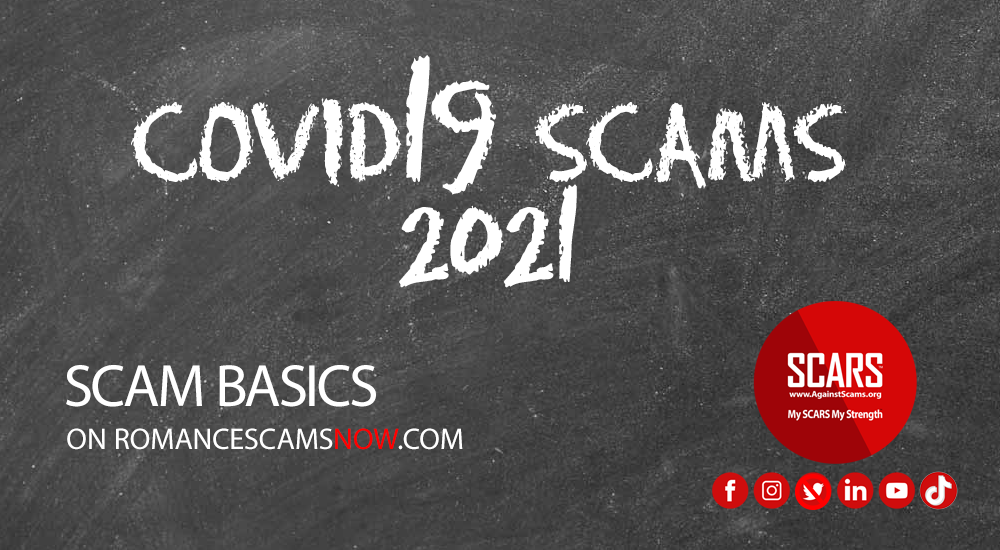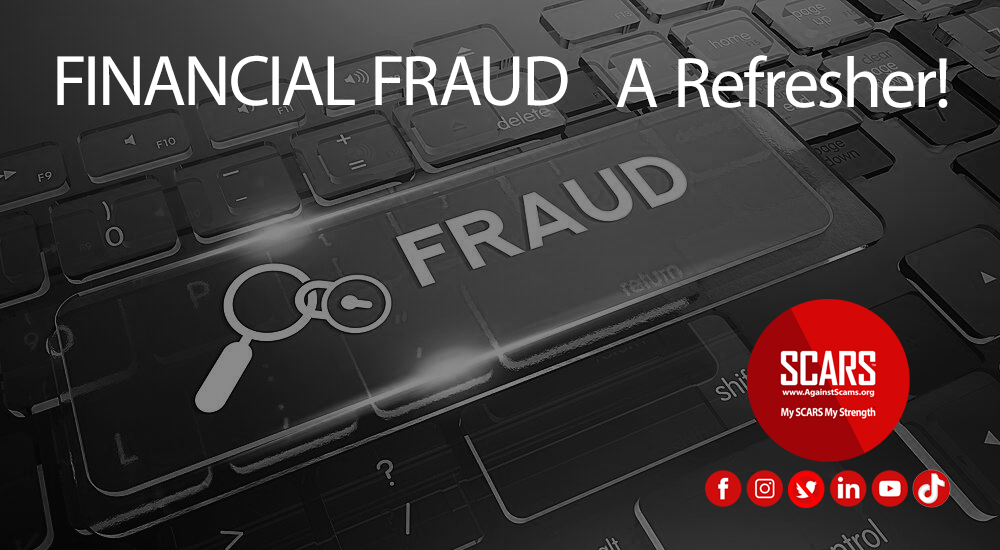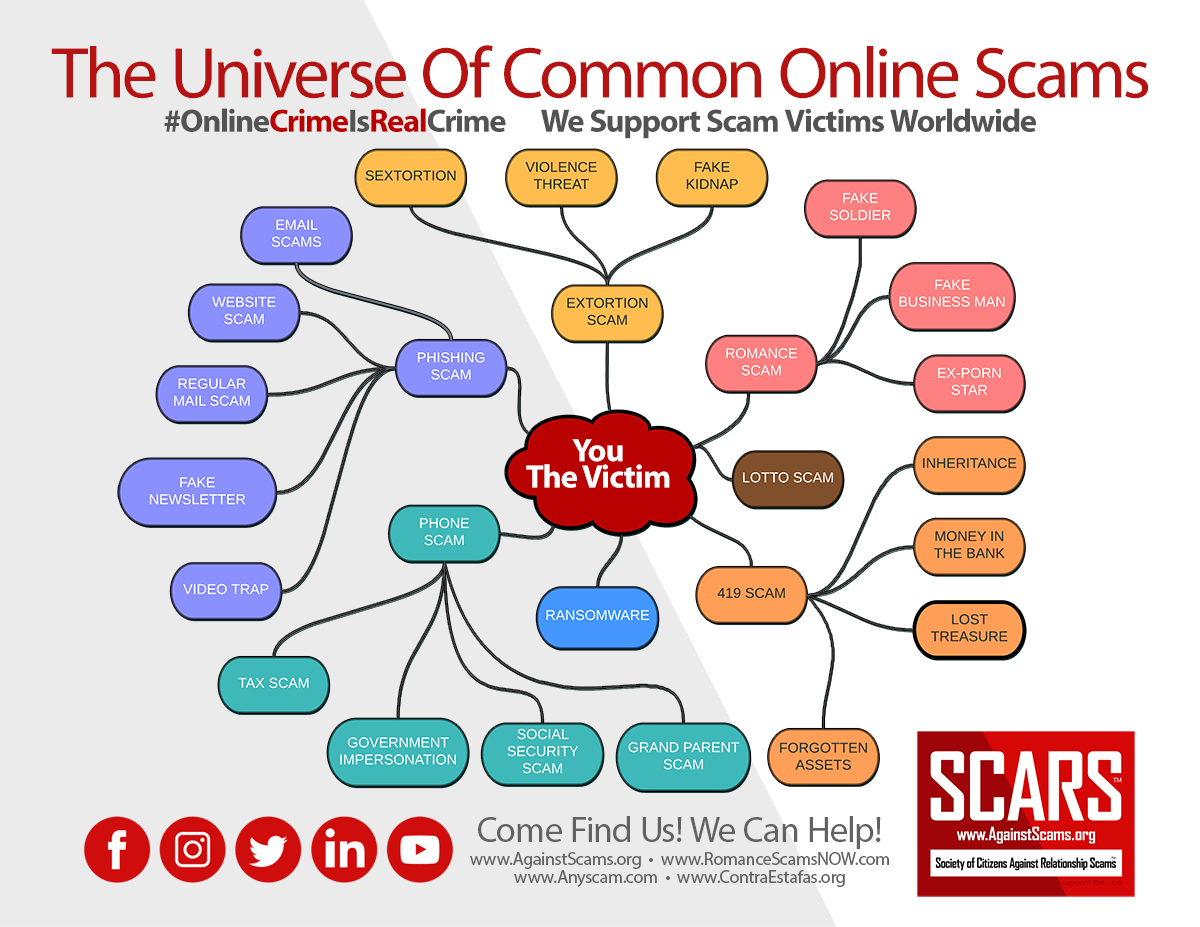
SCARS Institute’s Encyclopedia of Scams™ Published Continuously for 25 Years

Financial Crime Online – Don’t Become a Victim!
COVID Scams are still a very real threat, but there are more than just romance scams!
This refresher will help you to continue avoiding them!
Common Current Online & Phone Financial Crimes
Follow some common sense rules to reduce your chance of being a victim of financial crime
Criminals are quick to exploit the ignorance and vulnerability of their victims. The recent proliferation of devices, from smartphones and tablets to web-connected appliances, has opened us all up to even greater risks.
Yet by simply following a few common-sense rules, you can drastically reduce your exposure and the risk of being taken in by these fraudsters.
COVID-19 (coronavirus) Scams
We are seeing criminals trying to cash in on the coronavirus outbreak.
Medical supplies
With surgical masks and other medical supplies in high demand yet difficult to find in retail stores, fake shops, websites, social media accounts and email addresses claiming to sell these items have sprung up online.
But instead of receiving the promised masks and supplies, unsuspecting victims have seen their money disappear into the hands of the criminals involved.
Phone fraud
Criminals are also using telephone deception to carry out financial frauds – they will call victims pretending to work for a hospital or medical clinic, claiming that a relative of the victim has fallen sick with the virus and request payments for medical treatment.
In many cases, the fraudsters impersonate legitimate companies, using similar names, websites and email addresses in their attempt to trick unsuspecting members of the public, even reaching out proactively via emails and messages on social media platforms.
Warning signs
If you are looking to buy medical supplies online, or receive emails or links offering medical support, be alert to the signs of a potential scam to protect yourself and your money.
- Independently verify the company/individual offering the items before making any purchases;
- Be aware of bogus websites – criminals will often use a web address that looks almost identical to the legitimate one, e.g. ‘abc.org’ instead of ‘abc.com’;
- Check online reviews of a company before making a purchase – for example, have there been complaints of other customers not receiving the promised items?;
- Be wary if asked to make a payment to a bank account located in a different country than where the company is located;
If you believe you have been the victim of fraud, alert your bank immediately so the payment can be stopped. - Do not click on links or open attachments which you were not expecting to receive, or come from an unknown sender;
Be wary of unsolicited emails offering medical equipment or requesting your personal information for medical checks – legitimate health authorities do not normally contact the general public in this manner.
Non-Delivery Fraud
In non-delivery fraud, criminals promise victims highly sought-after goods, accept payment, then never deliver. While the principle is simple, the fraud scheme is often sophisticated. Criminals can adapt a well-established modus operandi to suit any product, whether it is medical equipment, puppies, office supplies or electronics.
Read the reasons non-delivery fraud works
Telecom/Phone Fraud
Random victims are contacted by a criminal claiming to be a friend, relative or someone in a position of authority and tricked into parting with money.
- DON’T panic! If you receive a call saying a friend or relative is in trouble, first try to check the identity of the caller but don’t call back the same number.
- DON’T give any personal or confidential information over the phone.
- DON’T trust someone who claims to be a government official or law enforcement officer; they never demand payment or confidential information. DO contact your local police to check.
Romance Scams
Criminals develop a “relationship” with victims through social media with the ultimate goal of obtaining money.
- DO be vigilant if you are approached by someone you don’t know, especially if it leads to a request for money.
- DO think twice before transferring money, however genuine the request might seem.
- DON’T disclose personal/confidential information on social media.
Investment/Boiler Room Fraud
Victims are pressured into investing in fraudulent or worthless shares.
- DO be skeptical if you receive a cold call on investment opportunities.
- DO verify the authenticity of investment products and consult an independent financial advisor.
- DON’T transfer money to anyone simply based on a call.
Sextortion
Victims (often men) are tricked by an attractive stranger into participating in naked videos chats which are secretly recorded and subsequently used for blackmail.
DO remember that nothing is private on the web and data cannot be erased.
DO ask pertinent questions and try to verify the identity of anyone who approaches you.
If you do receive a blackmail threat, DON’T pay up, report it to the police.
Learn more about Sextortion here
Payment Cards
- DO keep your cards safe. Regularly check your bank/credit card accounts.
- DO look carefully at ATMs and payment terminals to make sure there are no suspicious objects around the card slot.
- DO keep your distance from other people when using payment terminals.
- DON’T disclose your PIN/passwords. Banks will never ask you for this over the phone or by email.
- DON’T provide bank details unless you initiated the payment process.
If you are contacted by your bank to update details or take advantage of a special offer, DON’T click on the link in the email. Check out the legitimate website or contact the bank.
- DON’T make a payment online or do any online banking if you are connected to public Wi-Fi, as your information can be easily stolen.
Money laundering - DO be suspicious if you are asked to let someone else use your bank account.
- DO be wary of cash transactions concerning large amounts of money, there are much more secure payment methods available.
DON’T let yourself be manipulated. Criminal syndicates often operate by developing relationships with their victims before tricking them into handling money
Summary
Of course, these are just a quick summary of financial fraud schemes online and by phone. Please take the time to educate yourself about these crimes and how you are vulnerable to them!
EVERYONE CAN BE SCAMMED.
If you have not yet been scammed, it is just because you have not met the right scammer, or they were so good you did not even know it!
The information you need to stay say is on this website. Take the time to learn so you can be safe, and so you can help your family and friends to be safe!
TAGS: SCARS, Information About Scams, Anti-Scam, Scams, Scammers, Fraudsters, Cybercrime, Crybercriminals, Romance Scams, Scam Victims, Online Fraud, Online Crime Is Real Crime, Scam Avoidance, Non-Delivery Fraud, Payment Card Fraud, Sextortion, Financial Scams, Financial Fraud
PLEASE SHARE OUR ARTICLES WITH YOUR FRIENDS & FAMILY
HELP OTHERS STAY SAFE ONLINE – YOUR KNOWLEDGE CAN MAKE THE DIFFERENCE!
THE NEXT VICTIM MIGHT BE YOUR OWN FAMILY MEMBER OR BEST FRIEND!
By the SCARS™ Editorial Team
Society of Citizens Against Relationship Scams Inc.
A Worldwide Crime Victims Assistance & Crime Prevention Nonprofit Organization Headquartered In Miami Florida USA & Monterrey NL Mexico, with Partners In More Than 60 Countries
To Learn More, Volunteer, or Donate Visit: www.AgainstScams.org
Contact Us: Contact@AgainstScams.org
-/ 30 /-
What do you think about this?
Please share your thoughts in a comment below!
Table of Contents
- COVID Scams are still a very real threat, but there are more than just romance scams!
- Follow some common sense rules to reduce your chance of being a victim of financial crime
- Medical supplies
- Phone fraud
- Warning signs
- EVERYONE CAN BE SCAMMED.
- PLEASE SHARE OUR ARTICLES WITH YOUR FRIENDS & FAMILY
- By the SCARS™ Editorial Team
Society of Citizens Against Relationship Scams Inc.
LEAVE A COMMENT?
Recent Comments
On Other Articles
- Arwyn Lautenschlager on Love Bombing And How Romance Scam Victims Are Forced To Feel: “I was love bombed to the point that I would do just about anything for the scammer(s). I was told…” Feb 11, 14:24
- on Dani Daniels (Kira Lee Orsag): Another Scammer’s Favorite: “You provide a valuable service! I wish more people knew about it!” Feb 10, 15:05
- on Danielle Delaunay/Danielle Genevieve – Stolen Identity/Stolen Photos – Impersonation Victim UPDATED 2024: “We highly recommend that you simply turn away form the scam and scammers, and focus on the development of a…” Feb 4, 19:47
- on The Art Of Deception: The Fundamental Principals Of Successful Deceptions – 2024: “I experienced many of the deceptive tactics that romance scammers use. I was told various stories of hardship and why…” Feb 4, 15:27
- on Danielle Delaunay/Danielle Genevieve – Stolen Identity/Stolen Photos – Impersonation Victim UPDATED 2024: “Yes, I’m in that exact situation also. “Danielle” has seriously scammed me for 3 years now. “She” (he) doesn’t know…” Feb 4, 14:58
- on An Essay on Justice and Money Recovery – 2026: “you are so right I accidentally clicked on online justice I signed an agreement for 12k upfront but cd only…” Feb 3, 08:16
- on The SCARS Institute Top 50 Celebrity Impersonation Scams – 2025: “Quora has had visits from scammers pretending to be Keanu Reeves and Paul McCartney in 2025 and 2026.” Jan 27, 17:45
- on Scam Victims Should Limit Their Exposure To Scam News & Scammer Photos: “I used to look at scammers photos all the time; however, I don’t feel the need to do it anymore.…” Jan 26, 23:19
- on After A Scam, No One Can Tell You How You Will React: “This article was very informative, my scams happened 5 years ago; however, l do remember several of those emotions and/or…” Jan 23, 17:17
- on Situational Awareness and How Trauma Makes Scam Victims Less Safe – 2024: “I need to be more observant and I am practicing situational awareness. I’m saving this article to remind me of…” Jan 21, 22:55
ARTICLE META
Important Information for New Scam Victims
- Please visit www.ScamVictimsSupport.org – a SCARS Website for New Scam Victims & Sextortion Victims
- Enroll in FREE SCARS Scam Survivor’s School now at www.SCARSeducation.org
- Please visit www.ScamPsychology.org – to more fully understand the psychological concepts involved in scams and scam victim recovery
If you are looking for local trauma counselors please visit counseling.AgainstScams.org or join SCARS for our counseling/therapy benefit: membership.AgainstScams.org
If you need to speak with someone now, you can dial 988 or find phone numbers for crisis hotlines all around the world here: www.opencounseling.com/suicide-hotlines
A Note About Labeling!
We often use the term ‘scam victim’ in our articles, but this is a convenience to help those searching for information in search engines like Google. It is just a convenience and has no deeper meaning. If you have come through such an experience, YOU are a Survivor! It was not your fault. You are not alone! Axios!
A Question of Trust
At the SCARS Institute, we invite you to do your own research on the topics we speak about and publish, Our team investigates the subject being discussed, especially when it comes to understanding the scam victims-survivors experience. You can do Google searches but in many cases, you will have to wade through scientific papers and studies. However, remember that biases and perspectives matter and influence the outcome. Regardless, we encourage you to explore these topics as thoroughly as you can for your own awareness.
Statement About Victim Blaming
SCARS Institute articles examine different aspects of the scam victim experience, as well as those who may have been secondary victims. This work focuses on understanding victimization through the science of victimology, including common psychological and behavioral responses. The purpose is to help victims and survivors understand why these crimes occurred, reduce shame and self-blame, strengthen recovery programs and victim opportunities, and lower the risk of future victimization.
At times, these discussions may sound uncomfortable, overwhelming, or may be mistaken for blame. They are not. Scam victims are never blamed. Our goal is to explain the mechanisms of deception and the human responses that scammers exploit, and the processes that occur after the scam ends, so victims can better understand what happened to them and why it felt convincing at the time, and what the path looks like going forward.
Articles that address the psychology, neurology, physiology, and other characteristics of scams and the victim experience recognize that all people share cognitive and emotional traits that can be manipulated under the right conditions. These characteristics are not flaws. They are normal human functions that criminals deliberately exploit. Victims typically have little awareness of these mechanisms while a scam is unfolding and a very limited ability to control them. Awareness often comes only after the harm has occurred.
By explaining these processes, these articles help victims make sense of their experiences, understand common post-scam reactions, and identify ways to protect themselves moving forward. This knowledge supports recovery by replacing confusion and self-blame with clarity, context, and self-compassion.
Additional educational material on these topics is available at ScamPsychology.org – ScamsNOW.com and other SCARS Institute websites.
Psychology Disclaimer:
All articles about psychology and the human brain on this website are for information & education only
The information provided in this article is intended for educational and self-help purposes only and should not be construed as a substitute for professional therapy or counseling.
While any self-help techniques outlined herein may be beneficial for scam victims seeking to recover from their experience and move towards recovery, it is important to consult with a qualified mental health professional before initiating any course of action. Each individual’s experience and needs are unique, and what works for one person may not be suitable for another.
Additionally, any approach may not be appropriate for individuals with certain pre-existing mental health conditions or trauma histories. It is advisable to seek guidance from a licensed therapist or counselor who can provide personalized support, guidance, and treatment tailored to your specific needs.
If you are experiencing significant distress or emotional difficulties related to a scam or other traumatic event, please consult your doctor or mental health provider for appropriate care and support.
Also read our SCARS Institute Statement about Professional Care for Scam Victims – click here to go to our ScamsNOW.com website.









![To Be A Scammer? An Overview Of Scammers Fraudsters & Online Con Artists - 2024 [UPDATED] what is a scammer what-is-a-scammer](https://romancescamsnow.com/wp-content/uploads/2021/10/what-is-a-scammer.png)
![New Research Study on Stolen Valor - Military Scams - STUDY NOW COMPLETED [UPDATED] Military Impersonation Research Study New Research Study on Stolen Valor - Military Scams](https://romancescamsnow.com/wp-content/uploads/2022/03/Military-Impersonation-Research-Study.png)







Thank you for your comment. You may receive an email to follow up. We never share your data with marketers.